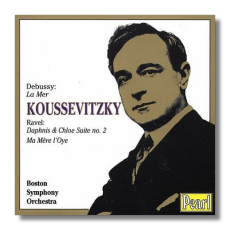
The Internet's Premier Classical Music Source
Related Links
- Latest Reviews
- More Reviews
-
By Composer
-
Collections
DVD & Blu-ray
Books
Concert Reviews
Articles/Interviews
Software
Audio
Search Amazon
Recommended Links
Site News
 CD Review
CD Review
Koussevitzky Conducts French Favorites

- Maurice Ravel: Daphnis and Chloé Suite #2
- Erik Satie: Gymnopedie #1
- Claude Debussy: La Mer; Danse
- Gabriel Fauré: Élégie
Jean Bedetti, cello
Boston Symphony Orchestra/Serge Koussevitzky
Pearl GEMM9090 (Koch) - 75min
Koussevitzky clearly wanted his La Mer to be as close to perfection as humanly possible. The recording session was scheduled for December of 1938, but only II was completed to the conductor's satisfaction that day. Almost a full year later, a second attempt was made. The first side alone was recorded six different times, and this in an era when retakes were rare and prohibitively expensive. Perhaps one reason for the many retakes was the conductor's insistence on the widest possible dynamic range. From the barely audible opening bars to the huge, amazingly undistorted climaxes of I and III, Koussevitzky was clearly pushing the limits of the technology of his era. There is no hint of the endless hours of grinding labor that went into the making of this phenomenal recording. Its spontaneity, boundless energy, and dramatic impact are as evident today as when it was originally issued. And the orchestral playing is nothing less than breathtaking. The Boston Symphony easily lives up to its reputation as the greatest orchestra of its - and perhaps any other - time. Koussevitzky tremendous gift as a musical story-teller is also evident in his tender, richly poetic Mother Goose. Languorous tempos, sublimely lyrical phrasing, and a magnificent succession of instrumental solos make this performance unforgettable. The shorter works of Debussy, Satie, and Fauré are all gloriously played and grandly interpreted. Koussevitzky's 1929 Daphnis Suite, though perfectly fine on its own, is not quite up to the standard that he himself set in his later recording. With that version readily available from RCA, the remaining space could have been put to better use. Mark Obert-Thorn's rich, full-bodied transfers are models of their kind.
Copyright © 1996, Thomas Godell


















